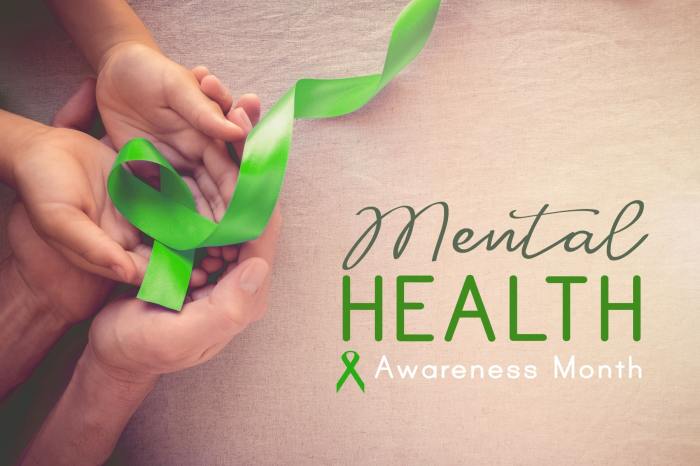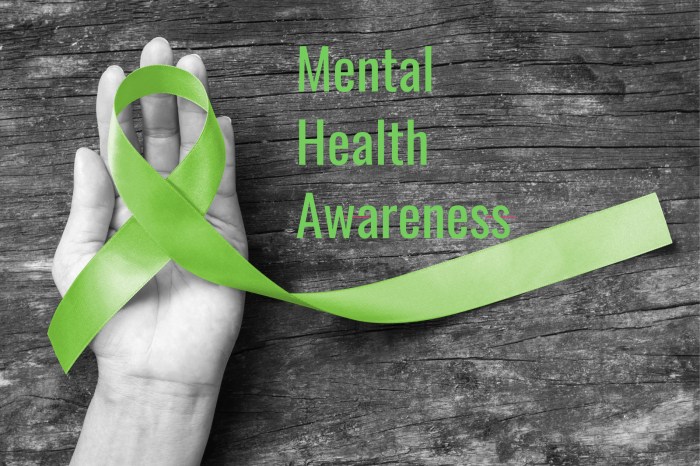Mental Health Awareness takes center stage in today’s society, shedding light on the importance of understanding and supporting mental well-being. From breaking stigmas to advocating for resources, this topic delves into a crucial aspect of overall health.
Overview of Mental Health Awareness

Mental health awareness refers to the understanding, knowledge, and acknowledgment of mental health conditions and the importance of taking care of one’s mental well-being. It involves recognizing the signs and symptoms of mental health issues, promoting mental health education, and reducing stigma surrounding mental health.
Importance of Raising Awareness about Mental Health
Raising awareness about mental health is crucial as it helps in early detection and intervention of mental health issues. By increasing awareness, individuals are more likely to seek help, leading to better treatment outcomes and improved quality of life. Additionally, raising awareness helps in reducing stigma and discrimination associated with mental health conditions.
Impact of Mental Health Awareness
Mental health awareness has a significant impact on individuals and society as a whole. It can lead to improved mental health literacy, increased access to mental health services, and better support systems for those struggling with mental health issues. By promoting awareness, we can create a more inclusive and supportive environment for individuals facing mental health challenges.
Prevalence of Mental Health Issues Globally
According to the World Health Organization, mental health conditions are on the rise globally, with an estimated 450 million people currently suffering from mental or neurological disorders. Depression, anxiety, and substance use disorders are among the most common mental health issues worldwide. It is important to raise awareness about these conditions to ensure timely intervention and support for those in need.
Stigma Surrounding Mental Health

Stigma surrounding mental health refers to the negative attitudes, beliefs, and stereotypes that are associated with mental illness. This stigma can lead to discrimination, isolation, and can prevent individuals from seeking the help they need.
Common Stigmas Associated with Mental Health
- Belief that mental illness is a sign of weakness
- Viewing individuals with mental health issues as dangerous or violent
- Assuming that people with mental illness cannot recover or lead fulfilling lives
How Stigma Can Prevent Individuals from Seeking Help
When individuals are stigmatized for their mental health issues, they may feel ashamed or embarrassed to seek help. This can lead to delays in getting treatment, worsening of symptoms, and overall negative impacts on their well-being.
Initiatives or Campaigns to Reduce Mental Health Stigma
- The “Time to Change” campaign in the UK aims to change attitudes towards mental health through education and awareness.
- The “Bell Let’s Talk” initiative in Canada encourages open conversations about mental health to reduce stigma.
Role of Media in Perpetuating or Challenging Mental Health Stigma
The media plays a significant role in shaping public perceptions of mental health. While some portrayals can perpetuate stigma by sensationalizing mental illness, others can challenge stigma by promoting understanding and empathy. It is important for the media to accurately represent mental health issues and highlight stories of recovery and resilience.
Mental Health Awareness Initiatives
When it comes to promoting mental health awareness, there are various initiatives and campaigns that aim to break the stigma surrounding mental health issues and encourage open conversations. These efforts play a crucial role in educating the public and providing support to those in need.
Different Mental Health Awareness Campaigns
There are numerous mental health awareness campaigns that have been successful in raising awareness and fostering understanding about mental health issues. These campaigns often utilize social media platforms, community events, and educational workshops to reach a wide audience.
- One example is the “#BreakTheStigma” campaign, which encourages individuals to share their personal stories and experiences with mental health to help reduce stigma and normalize conversations about mental well-being.
- Another successful campaign is “Mental Health Matters,” which focuses on providing resources and information about mental health support services to individuals in need.
Involvement of Celebrities and Influencers
Celebrities and influencers play a significant role in mental health advocacy by using their platforms to raise awareness, share personal experiences, and promote mental health resources. Their involvement helps destigmatize mental health issues and encourages others to seek help when needed.
- For example, actress Emma Stone has been vocal about her struggles with anxiety, helping to normalize discussions about mental health challenges.
- Rapper Logic released a song titled “1-800-273-8255,” which is the phone number for the National Suicide Prevention Lifeline, to raise awareness about suicide prevention and mental health support.
Personal Stories and Testimonials
Sharing personal stories and testimonials related to mental health awareness initiatives can have a powerful impact on individuals struggling with their mental health. These stories provide a sense of connection and empathy, showing others that they are not alone in their struggles.
- Individuals who have participated in mental health awareness campaigns often share how these initiatives have helped them seek treatment, find support, and feel less isolated in their mental health journey.
- By sharing their stories, these individuals inspire others to prioritize their mental well-being and reach out for help when needed.
Resources for Mental Health Awareness
In the effort to promote mental health awareness and support individuals in need, various organizations and platforms have emerged to provide valuable resources and tools. Education and training play a crucial role in raising awareness about mental health issues, while technology continues to advance efforts in reaching a wider audience.
Organizations and Platforms
- National Alliance on Mental Illness (NAMI) – A leading advocacy group dedicated to supporting individuals affected by mental illness through education, advocacy, and support programs.
- Active Minds – A nonprofit organization focused on empowering students to speak openly about mental health and seek help when needed.
- Mental Health America – Offers a wide range of resources, including screening tools, information on mental health conditions, and advocacy initiatives.
Tools and Resources
- Hotlines and Crisis Intervention Services – Immediate support for individuals in crisis, such as the National Suicide Prevention Lifeline.
- Online Mental Health Screenings – Tools that allow individuals to assess their mental health and seek appropriate help if needed.
- Therapy and Counseling Services – Accessible through mental health platforms and local mental health centers.
Importance of Education and Training
Education and training in mental health awareness are essential in breaking down stigma, providing accurate information, and promoting early intervention. By increasing knowledge about mental health conditions, individuals can better recognize symptoms, seek help, and support others in their communities.
Role of Technology
Technology plays a crucial role in advancing mental health awareness efforts by providing online resources, telehealth services, and mental health apps. These digital tools make information and support more accessible to a wider audience, especially in remote or underserved areas.